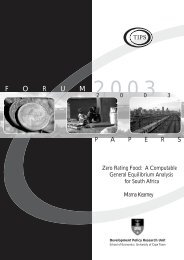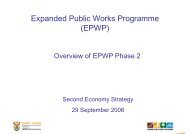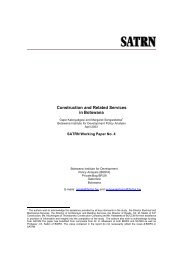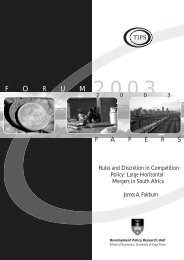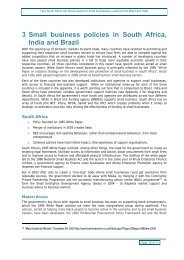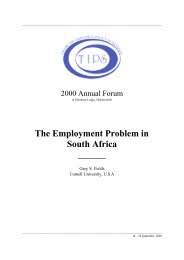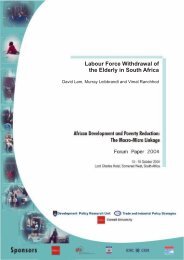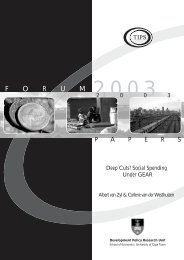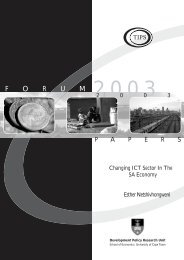(AsgiSA) Annual Report 2008 - South African Government Information
(AsgiSA) Annual Report 2008 - South African Government Information
(AsgiSA) Annual Report 2008 - South African Government Information
Create successful ePaper yourself
Turn your PDF publications into a flip-book with our unique Google optimized e-Paper software.
Accelerated and Shared Growth Initiative for <strong>South</strong> Africa<br />
ANNUAL REPORT<br />
<strong>2008</strong><br />
3.4.3 Employment creation “from below” – through micro-enterprise or self-employment<br />
– faces significant constraints and is a poverty trap for many<br />
• The structure of the economy constrains the scope for significant or sustainable expansion<br />
in this sector. However, the scope that does exist must be supported.<br />
• Evidence shows that those least likely to get a job are unfortunately also least likely to<br />
succeed in becoming self-employed.<br />
• Employment strategy cannot therefore rely on the poorest and most economically marginalised<br />
people in the economy ”self-employing” their way out of poverty.<br />
3.4.4 Increasing the contribution from micro-enterprises and self-employment requires<br />
“patient support” and improved conditions<br />
• Support to this sector needs to be designed within a more realistic set of expectations<br />
of its scope for growth. This means more focus on the ”patient support” required to turn<br />
”start-ups” into ”stay-ups”, and more caution in promoting self-employment as a solution<br />
for all.<br />
• This needs to go hand in hand with providing greater recognition and legitimacy to the<br />
sector, to improve conditions and returns in these often marginal economic activities. For<br />
street traders (the largest sub-component of the sector), this includes clear ”rules of the<br />
game” to reduce their risks and vulnerability to abuse; access to storage and ablution facilities,<br />
as well as services such as electricity supply where feasible; and support to forms<br />
of co-operation and organisation to reduce their costs and increase their ”voice”.<br />
• The current skills development framework does not enable access by this sector, and relies<br />
on supply-driven approaches that are often inappropriate. This needs to be addressed in<br />
the skills strategy.<br />
• New technology creates opportunities to fast-track increased access to financial services<br />
for the sector, including savings products, cash transfers, and access to micro-credit and<br />
to incremental housing finance to enable home-based enterprise activity. In a sector financed<br />
mainly by family and friends, tax credits for ”angel finance” (currently under<br />
design) need special adaptation to ensure access by more marginal enterprises.<br />
3.4.5 New and decent work is likely to come mainly from growth in the more developed,<br />
formal core economy, including the more formal end of the small and mediumsized<br />
enterprise sector<br />
• The employment focus in industrial policy needs to address issues of market access and<br />
the spread of power and benefits in value chains, to enable greater SME participation and<br />
employment creation.<br />
• This means transformation cannot focus on changes in ownership alone, but needs to also<br />
address issues of power and distribution in value chains.<br />
• Achieving this also requires stronger advocacy capacity and ”voice” from small producers<br />
and new entrants within sectors.<br />
• In certain contexts (e.g. agro-processing), access to wider markets may require co-ordination<br />
and co-operation between small producers to create economies of scale, or to reach<br />
the necessary volume and quality requirements. This creates opportunities for forms of<br />
business association and co-operative development.<br />
16



